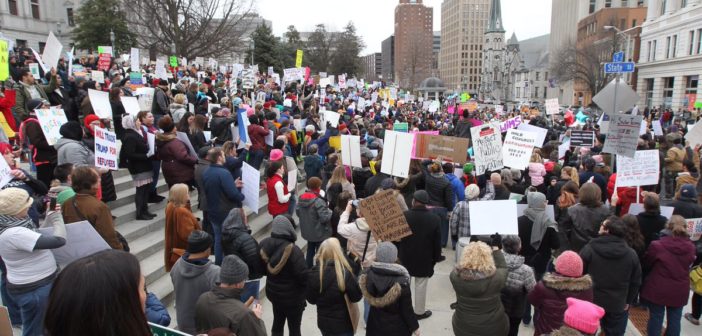[tribulant_slideshow gallery_id=”4″]
On Feb. 4, the Department of Homeland Security announced that all the actions associated with President Donald Trump’s executive order which had banned people from Libya, Syria, Iraq, Iran, Yemen, Sudan, and Somalia from entering the US had been suspended. Even though the people are now able to enter the country again, the new order had many implications which were unfortunate for immigrants from countries included on the list.
On Jan. 17, Trump signed an executive order that banned citizens of seven countries to enter the United States. The main reason of the executive order titled “Protection Of The Nation From Foreign Terrorist Entry Into The United States” was to prevent radical Islamic terrorists from entering the country, according to CNN.
The order was then blocked entirely on Feb. 4, 2017, by the Department of Homeland Security which resumed regular border protection controls the following day, according to CNN.
Trump’s executive order has been criticized by many people all around the world. A senior Computer Science student at Saint Leo University, Ammar Mohrat who came to the United States to begin his studies and seek asylum also elaborated on the issue and expressed his negative opinion about the order after it was signed.
“I believe that the executive order presented by Donald Trump is very unfair. Most of the terrorist attacks that happened in the US did not involve any of the people from the banned countries,” said Mohrat.
Mohrat noticed that the executive order was harmful not only to those people who wanted to seek asylum in the US, but also for those who have already become legal immigrants.
“It is also harmful to legal immigrants, or even non-immigrants who have visas, and who went through the process of obtaining them, because now they are not able to come to the country,” added Mohrat.
The student mentioned a story of Niki Mossafer Rahmati who studies at Massachusetts Institute of Technology.
“I just talked to one of my friends who presented me a story of an international student who received a scholarship at MIT, and he was supposed to come here. Because of the executive order he was not able to do it, and he was sent back to his home country. It makes no sense,” said Mohrat.
Rahmati, who visited her home in Teheran, Iran during for the winter break was prevented from boarding her connecting flight to Boston on Jan. 28 as Iran was on the list of countries mentioned in the executive order, according to college.usatoday.com.
The article includes information that Rahmati was blocked on the border even though she holds a multiple-entry student visa.
Mohrat indicates that people who have already become legal immigrants, including himself, should not be affected by the ban policy as it results in many unfortunate situations.
“I am a legal citizen here, I [am in the process of obtaining]my green card, and I should have the right to travel any time I want. Because of the executive order, I cannot do it, because I will not be able to come back. Now, I have to change all my plans, because I planned to travel, and meet my family, which I did not see for the last six years. The ban is planned to last for a limited amount of time, but you never know what’s going to happen next and how it will affect my rights,” said Mohrat.
The student notices that there are refugees seeking asylum for whom the process of obtaining all the necessary documentation was not easy. Nevertheless, the ban prevented them from coming to the US.
“There are refugees who went through an excessive screening process that takes up to 3 years, and who are not able to come to the US right now. Here are about 200 Syrians who were supposed to come to the U.S with the help of catholic organizations, but they won’t be able to make it,” said Mohrat.
Luckily for the refugees, they were able to proceed with their immigration process, and 100 Syrian refugees rushed into the country on Monday, Jan. 19 after the executive order was partially suspended by the Federal District Judge, James Robart, according to breitbart.com.
Mohrat is concerned about the issue as if he was not in the country such story could happen to him, and it is unknown where the student would be living his life right now.
“It could happen to me, and I would never be here then. I don’t know what I would do, but I would definitely have to travel the world or stay in Jordan where I probably wouldn’t have the same opportunities that I have in the U.S.,” said Mohrat.
Despite all the happenings, and chaos associated with the temporary ban issued by President Trump, Mohrat indicates that he is thankful for the opportunity that the United States as well as Saint Leo University gave him, and he wants to believe that Trump’s administration will also bring some benefits for the county.
“I still believe in American people, and I believe they chose Trump for other reasons that will let the country succeed,” concluded Mohrat.
A Profile on Mohrat
Ammar Mohrat is a senior computer science student at Saint Leo University. Mohrat comes from Syria from where he escaped to the United States as a refugee as he perceives it to be a land of an opportunity.
“I wanted to come here because I believed in the American freedom and the land of opportunities. And because I had no other choice I wanted to continue my education, and Saint Leo was the only school that wanted to help me,” said Mohrat.
Before attending Saint Leo, Mohrat was studying computer engineering at Al-Baath University in Homs, Syria. The student had to leave his home country as he felt endangered by the government. He indicates that if he stayed in Syria, he might have been killed.
He received help from Saint Leo University through the program designed for Syrian students, and after completing seven full semesters at the university campus, he will graduate in April.
“My experience has been very good so far, and I love it here. I haven’t experienced anything against me, and Saint Leo community is so great,” said Mohrat.
As one of the refugees, Mohrat indicates that it is important to resolve the refugee crisis and there are two solutions to the problem that in his opinion might help to achieve the goal.
“I believe that for refugees we either help them go back home and help them establish a new democratic regime, or we help them to have a better future in other countries until the war in Syria is over,” said Mohrat.





